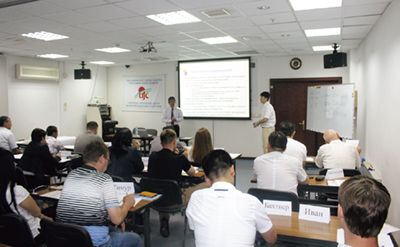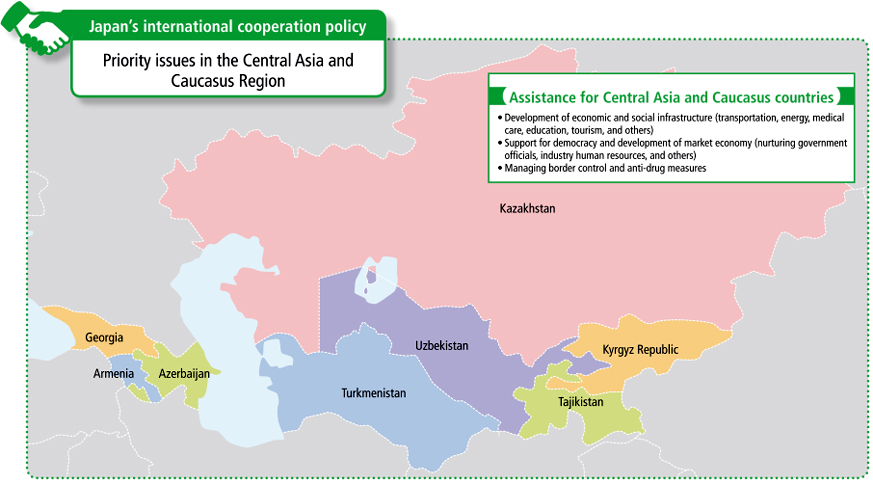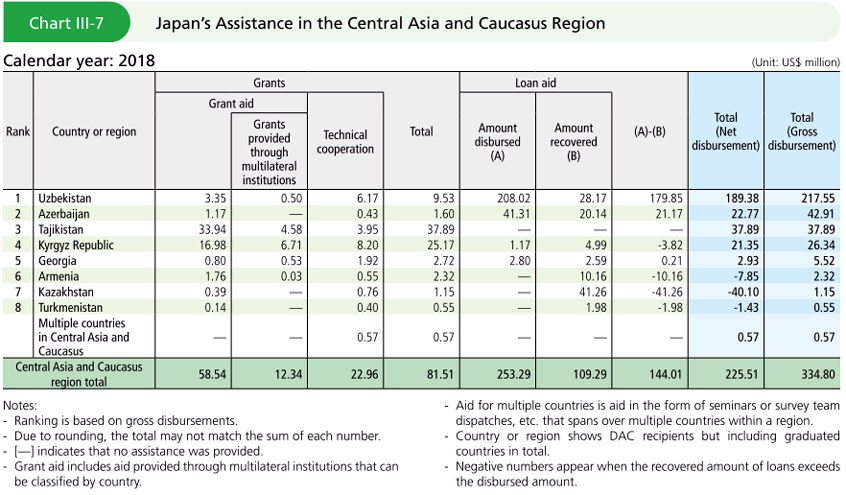6 Central Asia and Caucasus
The Central Asia and Caucasus region is surrounded by Russia, China, South Asia, the Middle East and Europe, and thus, the stability and development of this region significantly affects those of the Eurasian region as a whole. Also, since this region includes countries abundant in energy and mineral resources such as oil, natural gas, uranium, and rare metals, it is strategically important for Japan as it carries out resource and energy diplomacy with the aim of diversifying resource supplying countries. From this point of view, Japan has been supporting the spread of fundamental values in the countries of the region, such as human rights, democracy, market economy, and the rule of law, and nation-building efforts for long-term stability and sustainable development in this region, while taking into consideration a broader regional perspective which covers Afghanistan, Pakistan, and other neighboring regions surrounding Central Asia.
●Japan’s Efforts

A lecture in a production management course at the Uzbekistan-Japan Center for Human Resource Development in Uzbekistan (Photo: JICA)
Since the Central Asia and Caucasus countries’ independence in 1991 following the collapse of the former Soviet Union, Japan has been providing assistance in diverse areas such as development of aging infrastructure, human resources development for the transition to a market economy, and the rebuilding of social systems including health and medical care, in order to support the efforts of each country toward the transition to market economy systems and economic development.
With regard to its relationship with the Central Asian countries, based on the idea that it is important for the region to stabilize and develop as an open region, and for regional countries to work together to resolve common issues, Japan launched the “Central Asia plus Japan” dialogue framework in 2004, and has continued to strive to fulfill its role as a “catalyst” for regional cooperation. In recent years, Japan has been promoting more practical cooperation in addition to a variety of dialogues.
At the Seventh Foreign Ministers’ Meeting of the “Central Asia plus Japan” Dialogue held in Tajikistan in May 2019, former Foreign Minister Kono, who participated in the meeting, stated Japan’s intention to assist in the improvement of regional connectivity and infrastructure resilience using Japanese approaches, such as through the development of human resources. With regard to regional security and regional cooperation, he also noted that the stability of Central Asia and Afghanistan is closely linked to the security of the entire international community from the perspective of global issues to combat terrorism and narcotics, and that regional cooperation is essential for addressing such issues. Minister Kono also announced that based on these views, the Government of Japan will continue to provide support for Central Asian countries and Afghanistan, for the improvement of border control and so on.
At the occasion of the first visit to Japan after his inauguration of the presidency in December 2019, President of the Republic of Uzbekistan Mirziyoyev had a summit meeting with Prime Minister Abe for the first time in Tokyo. In this meeting, the friendly relations between Japan and Uzbekistan, which has traditionally been a pro-Japanese country, were reconfirmed, and Japan’s continued contribution to the development of Uzbekistan was expressed. For example, in order to further boost economic cooperation in the country, which had made significant progress since Prime Minister Abe’s visit to Uzbekistan in October 2015, Japan decided to provide ODA loans for the enhancement of power supply, which is a priority issue for the economic development of Uzbekistan, as well as high-value added agriculture, which is a main industry of the country, and job creation.
As for Japan’s relationship with the Caucasus countries, Japan announced the “Caucasus Initiative,” during former Foreign Minister Kono’s visit to Armenia, Georgia, and Azerbaijan in September 2018, based on the idea of promoting cooperation for self-sustained development of the Caucasus region, which plays an important role as a gateway linking Asia and Europe. Under this basic policy with the two pillars of support for human resources development aimed at nation-building, and support for the creation of an attractive Caucasus region through infrastructure development and improvement of the business environment, the Government of Japan has continued to provide assistance for human resources development and other supports.
In addition, Japan has accepted 10,647 trainees from Central Asia and Caucasus countries, and dispatched 3,463 experts to the region by 2017. Japan has also been providing support in the development of human resources necessary for new nation-building efforts, including the implementation of the Project for Human Resource Development Scholarship, which is a study-in-Japan program for young government officials, and the development of human resources for business through the Japan Center for Human Resources Development.


